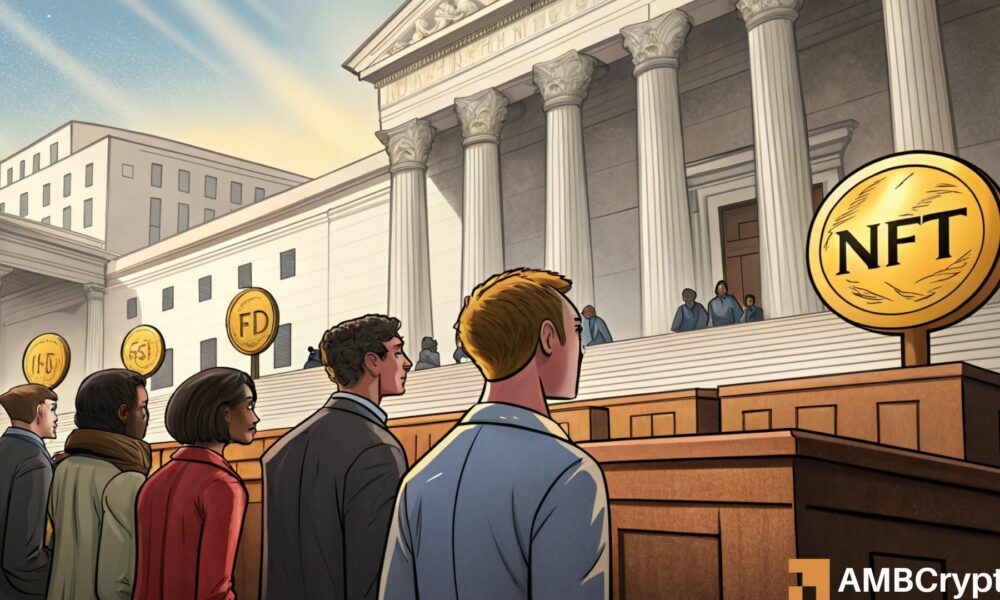Key Takeaways
NFTs are challenging trademark laws as courts test old rules in digital spaces. Major cases highlight confusion risks and evolving standards, pushing companies to safeguard brand identity in virtual goods.
Can you trademark a non-fungible token? The courts are hammering out a complicated “yes,” forcing old brand protection laws to fit a new digital world.
Trademarks exist for a simple reason: so you know who you’re buying from and don’t get tricked by knockoffs. This system protects the reputation businesses work hard to build.
It gives a company exclusive rights to the words, logos, or symbols that scream “This is ours!” But this whole system gets messy when the “product” is just a string of code on a blockchain.
The entire point of a trademark is to stop shoppers from getting confused. It answers the question, “Who’s behind this?” The law hinges on concepts like distinctiveness and use in commerce to prevent one seller’s goods from being mistaken for another’s.
Applying these ideas to the decentralized, wild-west environment of NFTs is proving to be a major legal headache.
Also, it’s common to confuse copyright and trademark, but they serve very different purposes. Think of it like this:
- Copyright covers the actual creative content—the picture, the song, the video file. Just because you buy an NFT doesn’t mean you buy the copyright to the art itself.
- Trademark covers the brand name or logo used to market the NFT project. It’s what separates Bored Ape Yacht Club from CryptoPunks.
Courtroom brawls over digital goods
A handful of major lawsuits are drawing the battle lines for how brands can and can’t be used in the digital marketplace.
Hermès v. Rothschild: A big win for big brands
Hermès, the luxury fashion brand, took legal action against artist Mason Rothschild over his “MetaBirkins” NFT project—digital images of furry handbags resembling the iconic Birkin bag. In February 2023, a New York jury ruled in favor of Hermès, concluding that Rothschild had infringed on the company’s trademark.
Hermès successfully argued that the NFTs could mislead consumers into thinking they were officially affiliated with the brand.
Rothschild defended his project as protected artistic expression, but the judge disagreed. The jury viewed the work as deceptive, and Rothschild was described as “simply a swindler.”
This case set a strong precedent, warning creators that using famous trademarks for digital products could lead to legal trouble.
However, the legal battle isn’t over—an appeals court is now weighing where to draw the line between art and trademark infringement.
Nike v. StockX: It’s complicated
Nike’s legal dispute with resale platform StockX has been particularly complex. The conflict began in early 2022 when Nike sued StockX over its “Vault NFTs”—digital tokens representing real Nike sneakers stored by StockX.
Nike argued that these NFTs misused its brand and misled consumers into thinking they were officially affiliated with the company.
In March 2025, the court delivered a partial ruling in Nike’s favor, confirming that StockX had sold counterfeit Nike shoes. However, the more significant issues—whether StockX’s use of Nike’s trademarks in its NFT project was legal—were left unresolved and are headed for a full trial.
The outcome of this case could set a major precedent for how digital marketplaces handle NFTs connected to physical goods.
Yuga Labs v. Ryder Ripps: A reversal for bored apes
Yuga Labs, the company behind the Bored Ape Yacht Club (BAYC), faced a setback in its legal battle with artist Ryder Ripps. In July 2025, an appeals court overturned a $9 million award that Yuga Labs had previously won.
The court ruled that Yuga Labs hadn’t sufficiently demonstrated that Ripps’s lookalike NFTs were likely to confuse consumers.
Although Yuga Labs lost this round, the decision still marked a significant moment for the broader NFT industry.
The court affirmed that NFTs are legally considered “goods,” which opens the door for other NFT creators to pursue trademark infringement claims—provided they can prove consumer confusion.
It all comes down to confusion
All these cases boil down to one legal test: the “likelihood of confusion.” Would a regular person looking at the product be confused about who made it or if it’s officially endorsed?
Courts are now figuring out how this applies online. In the Hermès case, the fact that luxury brands were already dabbling in NFTs made it seem more plausible that customers would believe the “MetaBirkins” were the real deal.
Hermès even brought receipts, showing news articles and social media posts from people who were genuinely confused.
How the world is handling NFT trademarks
Countries are figuring this out at their own pace.
United States: America is letting the courts lead the way by applying old laws to new tech. A 2024 Congressional report decided no new laws were needed yet, but admitted people are pretty confused about their rights when they buy an NFT.
European Union: The EU updated its rules to specifically mention virtual goods and NFTs. But they’re picky; you can’t just trademark “virtual goods.”
You have to specify what they are, like “virtual clothing.” This gets tricky since EU trademarks are tied to territories, but blockchains are borderless.
China: A Chinese court has already recognized NFTs as protected virtual property and held a platform liable for infringement.
The government is interested in metaverse technology but keeps a tight leash on the market and has banned cryptocurrencies outright.
What’s next for trademarks in the Metaverse?
“Phygital” NFTs—digital tokens linked to a real-world object—create a whole new set of problems. The biggest challenge is that buying the NFT doesn’t automatically make you the legal owner of the physical item
That relationship is all about the sales contract and what the seller promised you.
Therefore, the rulebook for trademarks in the metaverse is still being written, mostly by judges in real time. Experts think existing laws will keep being stretched and adapted, though some are pushing for new legislation to clear things up.
For now, companies are being told to get ahead of the problem by filing trademarks that explicitly name virtual goods and NFTs.
As our physical and digital lives continue to merge, the job of protecting a brand’s identity in these new, invisible marketplaces is only going to get more important.







